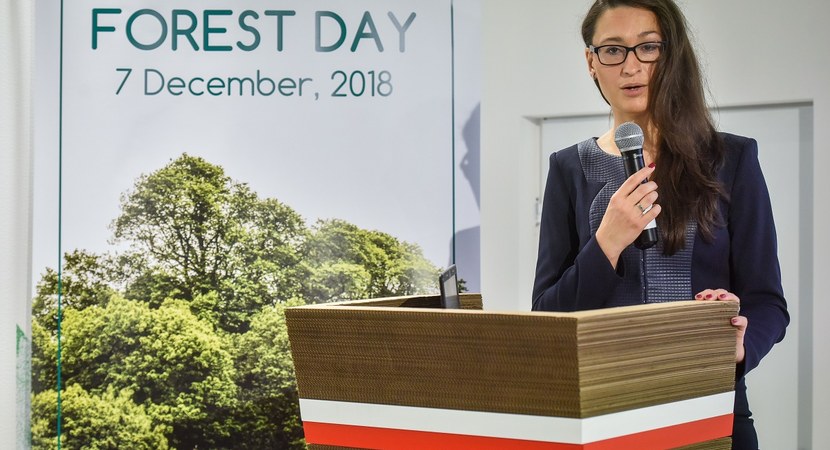COP24. FOREST DAY DURING CLIMATE CHANGE CONFERENCE
The fifth day of the international climate summit in Katowice was devoted to forests and its role in fighting against climate change. Participants of discussion panels appealed for managing forests in a sustainable manner.
Rene Castro, FAO’s Assistant Director General (ADG) of Climate, Biodiversity, Land and Water Department emphasized the unique role of forests:
‘The only solution that can be implemented is to use the sustainable forest management. It is important to use forests in a sustainable and reasonable manner as Polish foresters do’.
According to FAO representative, one way of reducing global CO2 emission and therefore stopping climate changes is to reclaim and afforest degraded areas. ‘Polish experience is very important here’ he assessed.
Castro claims that forestation of degraded areas is the fastest way to reduce the average global CO2 emission per capita. Effects of these activities may be visible in 10-15 years.
Delegates didn’t need convincing of forests’ role in combating climate change.
The key problem, however, is to create a system of how to use green resources. The fact that the method of such use should include the forest capacity to fight against climate warming, was emphasized multiple times during the conference. Polish model of forest management as well as the projects implemented by the State Forests were presented as a good exemplar of this method. Andrzej Konieczny, Director-General of the SF, listed initiatives that have been recently implemented by the State Forests, such as small retention and electromobility project. ‘Some of the projects implemented by the State Forests constitute the most ambitious undertakings in the EU’ – he summarized.
The project that caught everybody’s attention was the Carbon Forests Project. The CFP aims at using natural forest capabilities to absorb and store CO2 in plants’ tissues. Andrzej Jagodziński and Krzysztof Stereńczak from Forest Research Institute, precisely explained methodology for calculating carbon dioxide absorption by forests.
Another project that attracted much interest was the initiative undertaken in 2005 of ‘building’ green, live wall dividing the Sahara from the Sahel. Four State Forests’ employees along with group of volunteers were planting local tree species on savanna for a week.
The initiative of creating the green wall is financed by private funds. ‘I would like to thank the State Forests in Poland for the interest and support for our initiative’ said Ody-Marc Duclos, the Leader of the Green Heart Foundation.
Apart from interim help with tree planting, Polish foresters held the position of experts. Delegates emphasized the fact that the cooperation during forest planting in Africa is an example of good practice which needs to be popularized all over the world. Over 500 people from 18 countries participated in this project. ‘You have been motivating the society to renew forests for so many years. There are many deforested areas all over the world but with your support and knowledge we will motivate people to build the green wall together. Thanks to such actions our children and grandchildren will live in a green world’ said Duclos.
Tomasz Zawiła-Niedźwiecki, the Director of the Coordination Centre for Environmental Projects concluded the panel discussion by saying that apart from great initiatives such as small retention, and electric cars, one needs to remember about small everyday choices, which also can help mitigate the effects of climate change .






